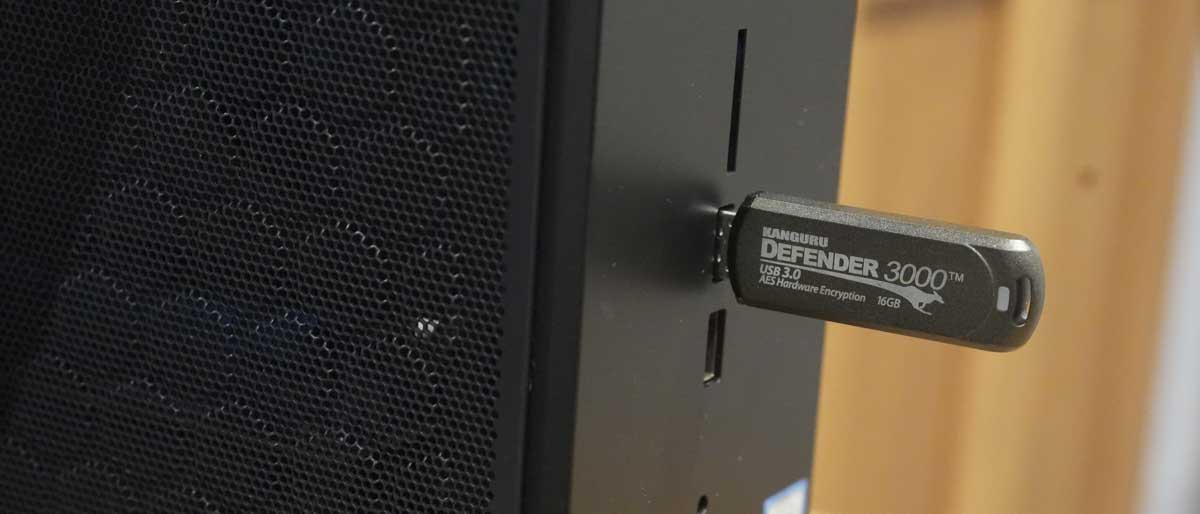TechRadar Verdict
The Kanguru Defender 3000, a costly USB key, is distinguished by its robust security features. Certified to FIPS 140-2 Level 3, it offers cryptographic security, brute-force attack protection, and physical durability. Its Command Console enables rigorous data management and remote control, making it ideal for safeguarding sensitive data in professional and personal settings.
Pros
- +
Ultra-secure data drive
- +
Wide USB Type-A compatibility
- +
Tough tamper-proof design
Cons
- -
Expensive for such a small device
- -
Subscription service required for some features
Why you can trust TechRadar
Kanguru Defender 3000: 30-second review
Capacity: 16GB, 32GB, 64GB, 128GB, 256GB, 512GB
Interface: USB 3.2 Gen 1x1
Software: Command Centre
Memory type: Solid State flash
Encryption features: FIPS 197 Certified, 256-bit AES Hardware Encryption XTS Mode, Overall Module FIPS 140-2 Certified, Level 3
The Kanguru Defender 3000, despite appearing to the uninformed like any other USB key due to its small, lightweight, and ultra-portable design, is far from average. Without the text and logo on its side, there would be nothing outwardly to suggest its advanced capabilities.
But this isn't your standard flash drive. In reality, it is a fully secure drive, FIPS 140-2 Certified, Level 3, with brute-force protection and FIPS 197 Certified AES 256-bit hardware encryption (XTS-Mode). It can be set up and controlled remotely using the Kanguru Remote Management Console, making it an ideal choice for business. It also features USBtoCloud, USB 3.0 technology (USB 3.2 Gen 1x1) for fast transfer speeds, onboard antivirus, a browser, and a clever Self-Service Password Management system.
Given all these features, the Kanguru Defender 3000 is expensive compared to other secure digital drives. Still, only some other drives are used or trusted by so many top-level companies and agencies
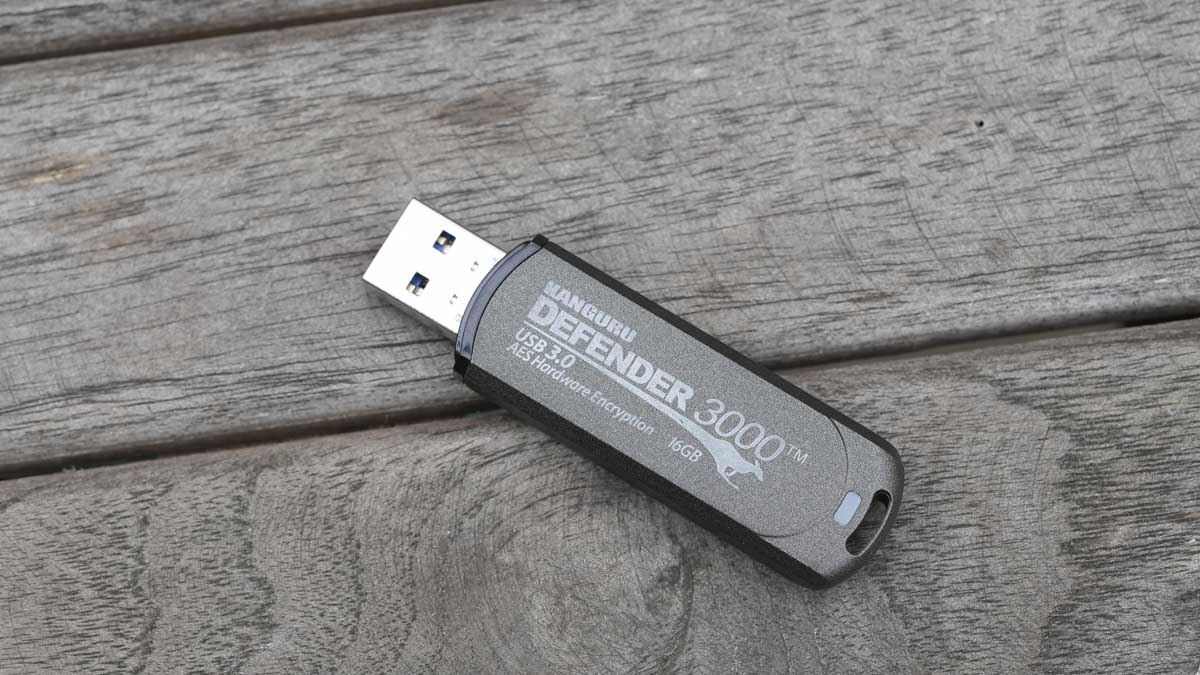
The setup and use are straightforward with the newly designed Management Console, providing an easy-to-use and administer interface for the drive. It's worth highlighting that there are two interfaces; the Command Console on the drive that is used by the user to manage their drive, and KRMC (Kanguru Remote Management Console) which is a different console used separately by an IT Administrator or Security Officer to manage and provision all of the drives in an organization.
The user console enables individual users to set passwords and access parameters in case the drive is lost or stolen, ensuring the contents remain secure. For corporations, the KRMC (Kanguru Remote Management Console) can be used to adminster multiple drives from one location, so they can set access, protection, limit logins, and secure drives either in groups or individually.
While use of the drive, once set up, is simple, the level of security and device management it offers goes well beyond any typical password-protected drive. If you have data, whether financial, passwords, or other sensitive information, that you need to ensure is absolutely safe, then the Kanguru Defender 3000 is one of the best secure drives available.
Kanguru Defender 3000: Price & availability
The Kanguru Defender 3000 is widely available from online stores, including Amazon.com. Prices range from $79.95 to $399.95, and it can also be purchased directly from the Kanguru website.
Sign up to the TechRadar Pro newsletter to get all the top news, opinion, features and guidance your business needs to succeed!
- Score: 4/5
Kanguru Defender 3000: Design & build
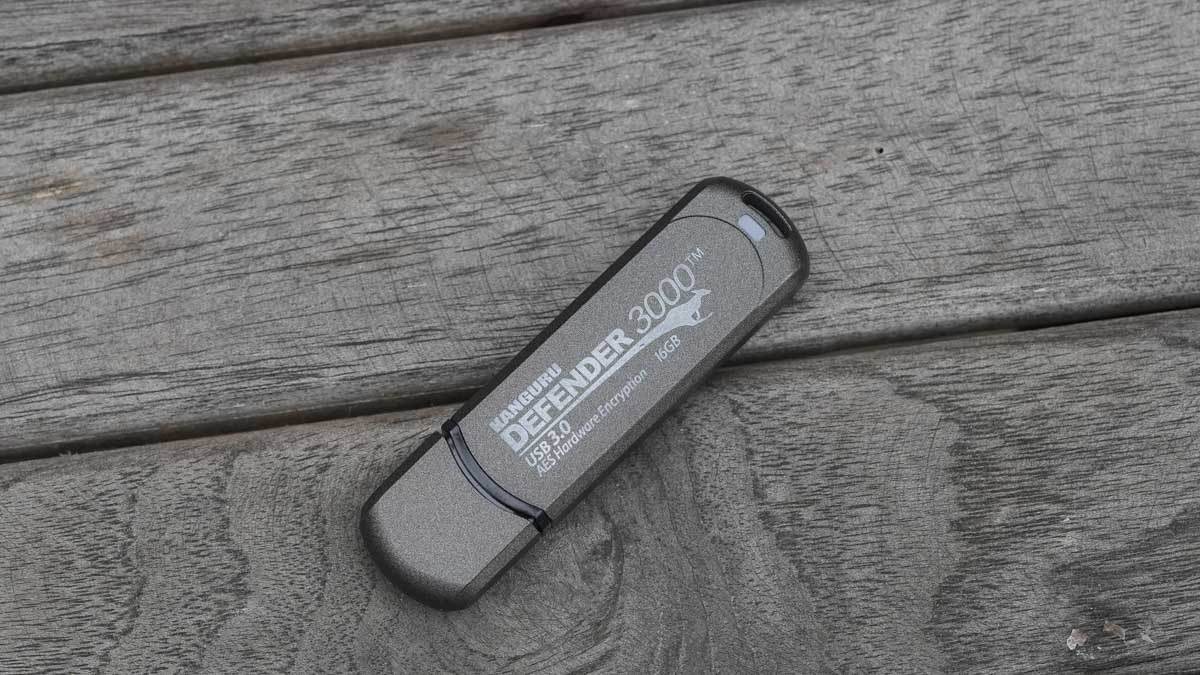
The Kanguru Defender 3000 instantly comes across as a high-quality USB drive, with its all-metal alloy casing protecting the internal electronics. Additionally, the USB Type-A connector is protected by a cap with a rubber seal to prevent water ingress. The drive is rated as waterproof as long as the cap is firmly in place to offer enhanced protection against water and dust.
The full metal construction makes this drive heavier than its cheap plastic counterparts, at 38g. It measures 72.19mm L x 19.47mm W x 8.92mm H, making it convenient to slip into the bag or jacket's side pocket without adding significant weight or bulk.
The small lanyard hole at the base is a noteworthy design detail that makes attaching it to a bag simple, so that it doesn't get lost. Also for maximum compatibility, using a USB Type-A connector over a newer Type-C connector makes sense even though Type-C is growing in popularity.
The drive is built to withstand harsh conditions. Its operating temperature range is 0°C to +70°C and its storage temperature range is -25°C to +85°C, making it suitable for most environments. It can also function in humidity levels between 20% and 90%, provided the machine it is connected to can handle such extremes.
Internally, the drive offers options ranging from 16GB to 512GB of Solid-State flash memory. Our review sample is the smallest, at 16GB. Notably, the drive's interior, hidden from view, is designed to ensure maximum data protection. It features built-in brute-force protection, with a water-resistant epoxy compound encasing the cryptographic controller, preventing physical tampering. Any attempt to remove the epoxy will destroy the flash chip, rendering the drive irrecoverable.
Despite its exterior resemblance to a standard USB key, the Kanguru Defender 3000's design is far more sophisticated, intended to uphold the integrity and security of the stored data.
- Score: 4.5/5
Kanguru Defender 3000: Features
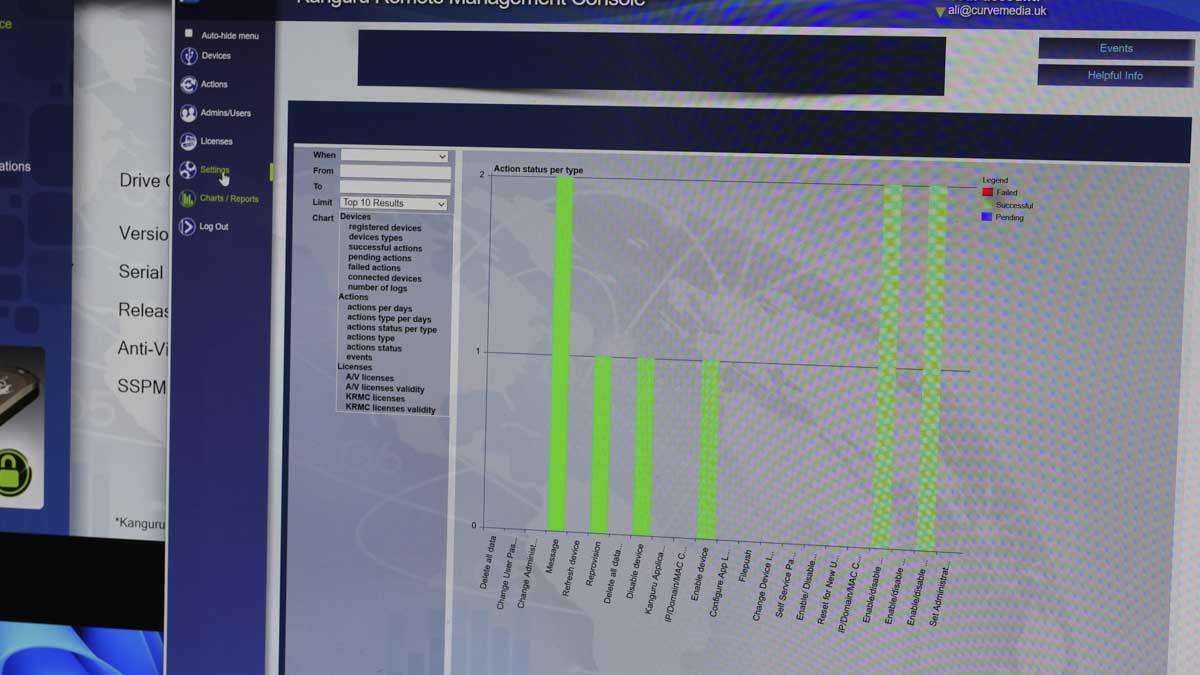
The Kanguru Defender 3000 safe flash drive guarantees compliance with certain regulatory criteria and focuses it storage on data security. When it comes to certification it offers a FIPS 140-2 Level 3, which indicates its capacity to protect private data, it is also recognised as secure enough for moving data in professional fields including government, healthcare, and finance.
The drive's tough metal and tamper-proof design is both on the inside and out and helps to provide strong physical brute-force protection. Water-resistant epoxy is also used to totally enclose and protect the cryptographic controller, essentially stopping physical hazards and anyone trying to physically break their way in.
At its heart, the Defender 3000 employs FIPS 197 certified AES 256-bit hardware encryption in XTS mode, providing advanced data security while minimising performance impact during transfers.
Through the Command Console, setup and management is easy using the graphical user interface. Along with other onboard programs, you can also control drive settings and status, track storage, and handle antivirus and remote management subscriptions. USBtoCloud is one of those subscription services that helps add an extra security layer through encrypted cloud backups. This ensures data remains secure and recoverable even if the physical drive is lost or stolen.
Defender 3000's defence against cyber threats is enhanced by RSA-2048's secure, digitally-signed firmware, which protects against malware tampering and secures network integrity.
Its SuperSpeed USB 3.0 technology allows for quick data transfers, which is essential for accessing large files rapidly, while USB 2.0 compatibility increases the drive's versatility.
BitDefender's onboard antivirus protection provides real-time scanning, and depending on the drive's setup, subscriptions are available for additional security.
For organisations needing centralised data security control, the Kanguru Remote Management Console (KRMC) offers a platform to manage multiple Defender 3000 drives as well as other Kanguru Defender drives, enforce security policies, manage configurations, and respond to security incidents. This also enables administrators to send secure messages to the drive, which appear when the user connects the drive to a computer with network connection.
The drive includes self-service password management, simplifying password recovery for users.
Finally, the Defender 3000 complies with regulatory standards, including TAA compliance, ensuring it meets the legal and ethical requirements of government and regulated industries.
- Performance: 4.5/5
Kanguru Defender 3000: Performance
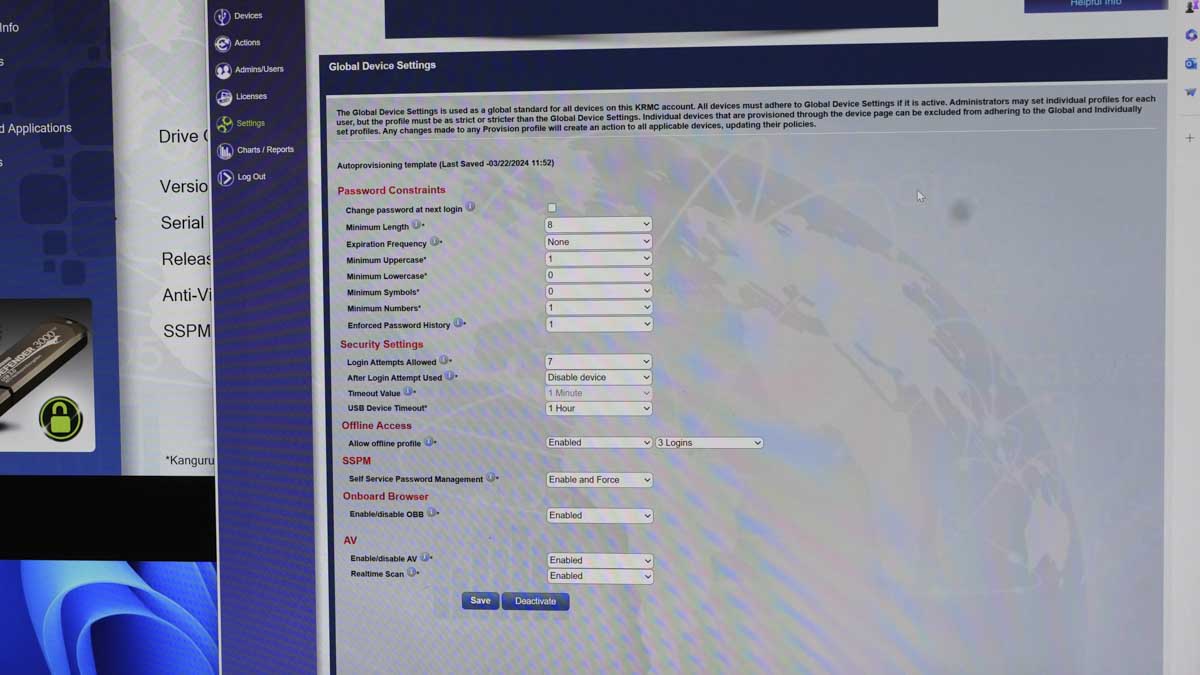
CrystalDiskMark: Read: 157.26MB/s Write: 121.56MB/s
AJA: Read: 115MB/s Write: 148MB/s
ATTO: Read: 116.63MB/s Write: 149.42MB/s
AS SSD: Read: 114.95MB/s Write: 148.33MB/s
If you're accustomed to plugging in a USB drive, setting basic password protection, and then using it for file storage, the Kanguru Defender 3000 will initially seem like a different world.
Upon the first insertion, the drive launches a setup console that guides you through the setup process, including email and personal association, passwords, and other protection and encryption settings. This relatively quick process secures the drive and its data.
For individuals, this offers peace of mind with various security options, like the number of password attempts before locking, offline usage, and renewals for self-service password management ($6.95 per year) or antivirus subscriptions ($7.95 per year)—both very affordable. Remote login via the KRMC web interface allows access to all drive settings and options, a feature that proves invaluable for larger organizations.
For companies handling sensitive data, these drives ensure hardware-level security. If a drive is lost or stolen, the data remains inaccessible. Changes at the access level, rather than the data itself, can be managed through the KRMC interface for individual or multiple drives.
Administrators can manage numerous drives in the field, adjusting access settings as needed. For example, they can limit offline access to three uses, updating these settings through the console, which then applies when the drive connects to a server. Settings can also be adjusted to allow freer access.
The drive allows setting a homepage for the onboard secure Firefox browser, providing not just security but also monitoring and access adaptability for corporate Use.
For anyone needing secure data storage, this drive is essential. For individuals concerned about securing passwords and digital data, it offers a reliable solution.
After setup, the drive functions differently from standard USB drives. It prompts for a password through a hardware-based interface, similar to a CD or DVD, before accessing the drive's storage. Users can easily switch to the console to adjust settings or administer online, both interfaces being user-friendly and accessible.
- Performance: 5/5
Should you buy the Kanguru Defender 3000?
The Kanguru Defender 3000 is a great portable USB storage option if security is a priority and you handle private information. Its high-end security, FIPS 140-2 Level 3 certification, and AES 256-bit encryption should give you piece of mind. On top of the standard security, there's also the additional features that enable you to administer the drive remotely and secure data through cloud backups. However, it's also worth considering the cost and complexity before purchasing; if your data security needs are minimal or budget is a concern, then Kanguru does offer more cost-effective solutions available, such as the Kanguru Defender Elite300, Defender Elite30, and Defender Bio-Elite30..
| Row 0 - Cell 0 | Row 0 - Cell 1 | Row 0 - Cell 2 |
| Value | High security at a premium price. | 4 |
| Design | Robust, compact, and water-resistant design. | 4.5 |
| Features | Advanced security features and remote management. | 5 |
| Performance | Fast, reliable, and secure performance. | 5 |
| Total | A top-tier secure USB drive. | 4.5 |
Buy it if...
Security is a priority
For those requiring top-notch data protection with advanced security features, including encryption and remote management.
You work with sensitive information
This is ideal for industries like finance, healthcare, or government, where data security is paramount.
Don't buy it if...
You're on a budget
The high-end security features come with a premium price, not ideal for casual or low-budget needs.
You only need a basic USB flash drive
If you just need simple storage without the extra security layers, this may be more than necessary.
We tested the best business laptops - and these are the professional-grade devices we rate
Alastair is a photographer, filmmaker and tech writer who has been working in the publishing industry since the late 1990s. For more than 25 years he has covered photography, video and technology across Future's photography, technology and gaming brands. He runs a photography and video production company and lectures in TV and film. He can usually be found testing mini PCs or prototyping and prop building with the aid of 3D printing.
